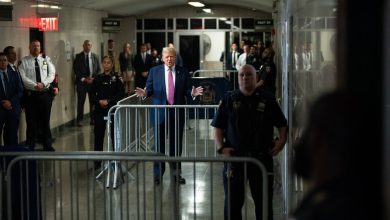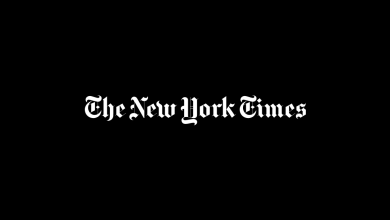Will Inflation Fix Itself?


Credit…Saul Loeb/Agence France-Presse — Getty Images
Targeting a soft landing
The Fed, as expected, raised interest rates yesterday, by a quarter of a point. It is the start of what will most likely be a monthslong, if not yearslong, campaign to tame the worst bout of inflation in decades without damaging the economic recovery that the central bank’s efforts during the pandemic helped foment.
A “soft landing” won’t be easy. To slow rapid price rises, Fed officials are preparing to raise rates six more times this year, and five times in 2023, according to their official projections (which, of course, could change). That would be three more in total than its previous cycle of rate increases, from 2015 to 2018, in roughly half the time. Nonetheless, the Fed chair, Jay Powell, stressed that the economy was strong enough to absorb higher rates, which could slow spending and investments by raising borrowing costs. “The probability of a recession within the next year is not particularly elevated,” Powell said.
Is the Fed painting too rosy a scenario? In a revised economic forecast, also released yesterday, the central bank predicted that inflation would be markedly higher than previously expected and that growth would be slower. That combination is usually bad for the labor market, but the Fed also predicted that unemployment would remain historically low. Joseph Gagnon, a former Fed official now at the Peterson Institute for International Economics, called this “a bit optimistic” but said that he still thought a soft landing was possible. “Long-run inflation expectations have not ratcheted up the way they did in the 1970s,” he told DealBook.
The bank appears to be betting that inflation will solve itself. The Fed’s preferred gauge of inflation is running at just over 6 percent, and the official forecasts expect it to fall closer to 4 percent by the end of this year. A good deal of that drop, though, comes not from higher interest rates, but from the expectation that supply chain problems will fade, even as the war in Ukraine and pandemic lockdowns in China threaten to snarl trade. “While the Fed is no longer using the word ‘transitory’ for inflation, they still seem to be counting on it,” Vincent Reinhart, a former Fed official now at Dreyfus and Mellon, told DealBook.
The market isn’t sure what to make of this. After an initial wobble, the stock market rose, with investors seemingly heartened by Powell’s optimism. That didn’t have the same effect on the bond market, with the 10-year Treasury yield, which tends to rise when bond investors are heartened by economic growth, roughly flat. Shorter-term bond yields rose strongly, however, resulting in a flatter yield curve that could be seen as a sign that investors think the Fed’s rate increases will hit the economy harder than expected. “The Fed has yet to be tested, but I think what the yield on the 10-year is saying is that investors don’t believe they will pass the test,” Reinhart said.
Further reading: “Inflation vs. Recession: The Fed Is Walking a Tightrope”
HERE’S WHAT’S HAPPENING
A Senate panel advances President Biden’s Fed nominees. Speaking of Jay Powell, he and three other candidates for positions on the central bank’s board of governors were approved by the Senate Banking Committee yesterday. The move came after Sarah Bloom Raskin asked to withdraw her nomination to be the Fed’s top banking regulator, which had held up the other picks.
An appeals court clears a key part of Biden’s environmental plans. The White House can proceed with policies that rely on higher estimates of the cost of climate change, a panel of appellate judges ruled. The decision overturns a lower court’s block but could still be reviewed by the full appeals court.
Bridgewater becomes an issue in Pennsylvania’s Senate race. Mehmet Oz, celebrity doctor and rival for the Republican nomination against David McCormick, Bridgewater’s former C.E.O., accused the giant hedge fund of delivering poor returns for the state’s retirement fund for teachers — while charging $500 million in fees. The attack hits at McCormick’s effort to run on his success at Bridgewater.
Chris Cuomo seeks $125 million from CNN. The former anchor is claiming both the $15 million that he is owed from his contract after he was fired, as well as “future wages lost.” Cuomo argues that he was wrongfully terminated after failing to disclose how much he had advised his brother, the former New York governor Andrew Cuomo, in a sexual harassment scandal.
The trial of Theranos’s president is delayed, again. The judge overseeing the criminal fraud case against Ramesh Balwani postponed court proceedings, citing a trial attendee’s potential exposure to Covid. The trial had originally been scheduled to start in January.
‘All American companies must leave Russia’
In a speech from Kyiv to Congress yesterday, President Volodymyr Zelensky of Ukraine urged U.S. lawmakers to “do more” to help his country repel Russia’s invasion. He also called for more American companies to pull out of Russia. “All American companies must leave,” he said, describing the Russian market as “flooded” with Ukrainian blood.
As Zelensky spoke, a professor at the Yale School of Management, Jeffrey Sonnenfeld, listened with interest. Since the invasion, Sonnenfeld, who advises corporate leaders on hot-button issues, has published a list of businesses that have pulled out of Russia. “I thought that was terrific,” he told DealBook, referring to Zelensky’s demand.
More than 400 companies with ties to Russia have taken action. The list is constantly shifting, Sonnenfeld said. Yesterday, he published a more nuanced version to reflect distinctions that seemed to be missing as companies’ varied actions and announcements have gotten complicated.
“Some are still trying to hedge,” Sonnenfeld noted. Originally, the list was split into “withdraw” and “remain,” but many companies are doing a bit of both, he said. As company reps have been calling him with “spin” about their approach, he felt the list needed to show more variations, and it now includes four categories: “withdrawal,” “suspension,” “scaling back” and “digging in.” His team was fielding company requests as he spoke with DealBook, he said, and “today we had a dozen begging to shift categories.” (The German industrial group Bosch, for example, moved from “digging in” to “scaling back” between morning and afternoon.)
Law firms are coming under similar scrutiny, with professors from Harvard, Stanford and Yale law schools yesterday publishing a list of what 100 large firms have said about their business with Russia. Some of the firms are “splitting hairs” about their actions, the professors wrote, noting that closing an office in Russia is not the same as pledging to stop work for clients with ties to Russia’s government. “When McDonald’s shuts its doors in Moscow, it cannot mail burgers from London. By contrast, law firms can and do serve Russian interests from afar,” they wrote. The professors will track firms “exiting” (three so far), “not exiting” (about 30), and the “silent” majority. “We believe democracy-loving firms will do more,” the professors wrote.
The latest on the Russia-Ukraine war:
-
Russian oligarchs got richer despite past sanctions. Will this time be different?
-
On a related note, the I.R.S. wants to add agents to a 3,000-person investigations unit to crack down on oligarchs evading sanctions, and Spain impounded another superyacht.
-
The U.S. and its allies have imposed sweeping export controls on Russia. Now they have to enforce them.
-
C.E.O.s are building their own “mini-State Departments” to navigate increasingly complex geopolitical risks.
-
For up-to-the-minute news, see The Times’s live blog and updated maps.
“I think, right now, people are afraid to get it wrong. And there’s so much to get wrong from a boss’s perspective.”
— Lacey Leone McLaughlin, a consultant who specializes in coaching Hollywood executives about dealing with the demands and expectations of their young assistants. As one executive told New York magazine, “She’s who you call when you need to play defense against a town that’s pretty quick to cancel people.”
Howard Schultz returns, again
Howard Schultz, the man who made Starbucks a global coffee empire, has stepped back into the C.E.O. spot for a third time — on an interim basis — after Kevin Johnson abruptly announced plans to retire. It isn’t entirely clear why Schultz, who retired from Starbucks in 2018 after a long run alternating as C.E.O. and chairman, has returned now — but there are plenty of clues.
Unionization pressures probably played a role. Starbucks performed well under Johnson, even during the pandemic. But the company has faced pressure from workers who have complained about labor conditions — and who have increasingly moved to organize. At least six of Starbucks’s roughly 9,000 company-owned stores have voted to unionize, despite opposition from the company, with 100 more stores filing for union elections. Federal labor officials recently filed a complaint against Starbucks over claims of retaliation against organizers.
Schultz obliquely referenced the union issue. “I know the company must transform once again to meet a new and exciting future where all of our stakeholders mutually flourish,” he said in a statement yesterday. (Mellody Hobson, Starbucks’s chair, told CNBC more directly that the company had “made some mistakes” in addressing worker concerns.)
Union organizers appear skeptical about Schultz’s return. “We encourage Howard Schultz, who has been a leader of Starbucks’ anti-union campaign, to put union-busting behind him and embrace Starbucks’ unionized future,” Starbucks Workers United tweeted yesterday. They alluded to Schultz’s previous opposition to unions, including a meeting with managers at a Buffalo area store last year that was seen by some as a bid to oppose the organization efforts.
That said, shareholders appeared happy with Schultz’s return: Shares in Starbucks rose 5 percent on the news.
THE SPEED READ
Deals
-
More potential bidders for the English soccer team Chelsea F.C. have emerged, including the investment firm Oaktree and a group with Citadel’s Ken Griffin and the owners of the Chicago Cubs. (FT, Bloomberg)
-
The investment firm Sycamore Partners and the retailer Hudson’s Bay each reportedly plan to offer more than $9 billion for Kohl’s. (WSJ)
-
The investment firm EQT agreed to buy Baring Private Equity Asia for $7.5 billion, potentially foreshadowing more takeovers of private equity firms. (Axios)
Policy
-
A French cloud-computing company filed an antitrust complaint against Microsoft in the E.U., citing licensing practices that make it harder to use other services. (WSJ)
-
“The Economy’s Terrible, G.O.P. Governors Say. Just Not in Their States.” (NYT On Politics)
-
The Biden administration withdrew $377 million in unspent pandemic aid to several states and diverted it to four that had requested additional funding, including California and New York. (NYT)
Best of the rest
-
Taking a taxi or Uber? Prepare to pay more, thanks to rising fuel prices. (WaPo)
-
The pandemic-driven e-commerce craze has made New York City a national hub for shipping warehouses. (NYT)
-
AT&T’s WarnerMedia and Discovery drew criticism after failing to name any Latinos to the board for their coming merger. (LA Times)
-
The rise of video streaming has fueled a boom in TV and film production in Britain. (NYT)
We’d like your feedback! Please email thoughts and suggestions to [email protected].



